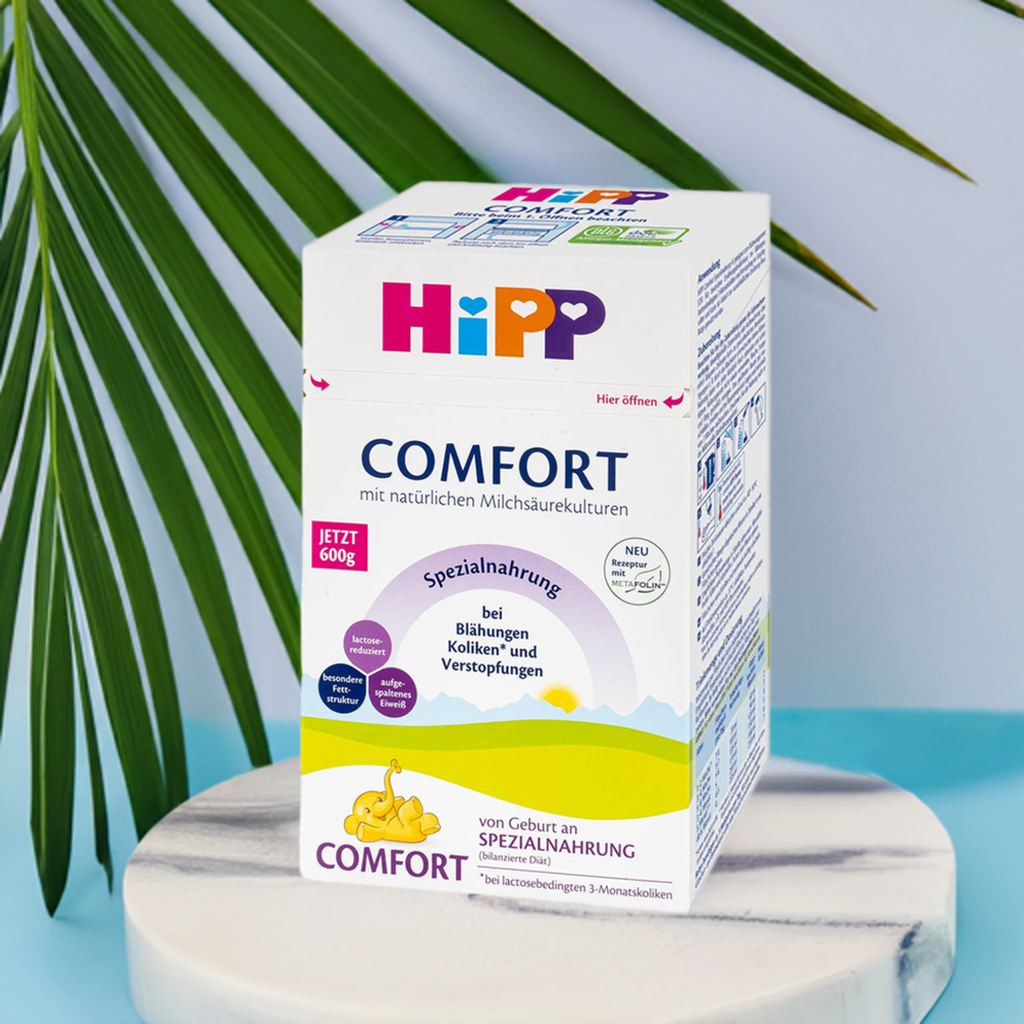
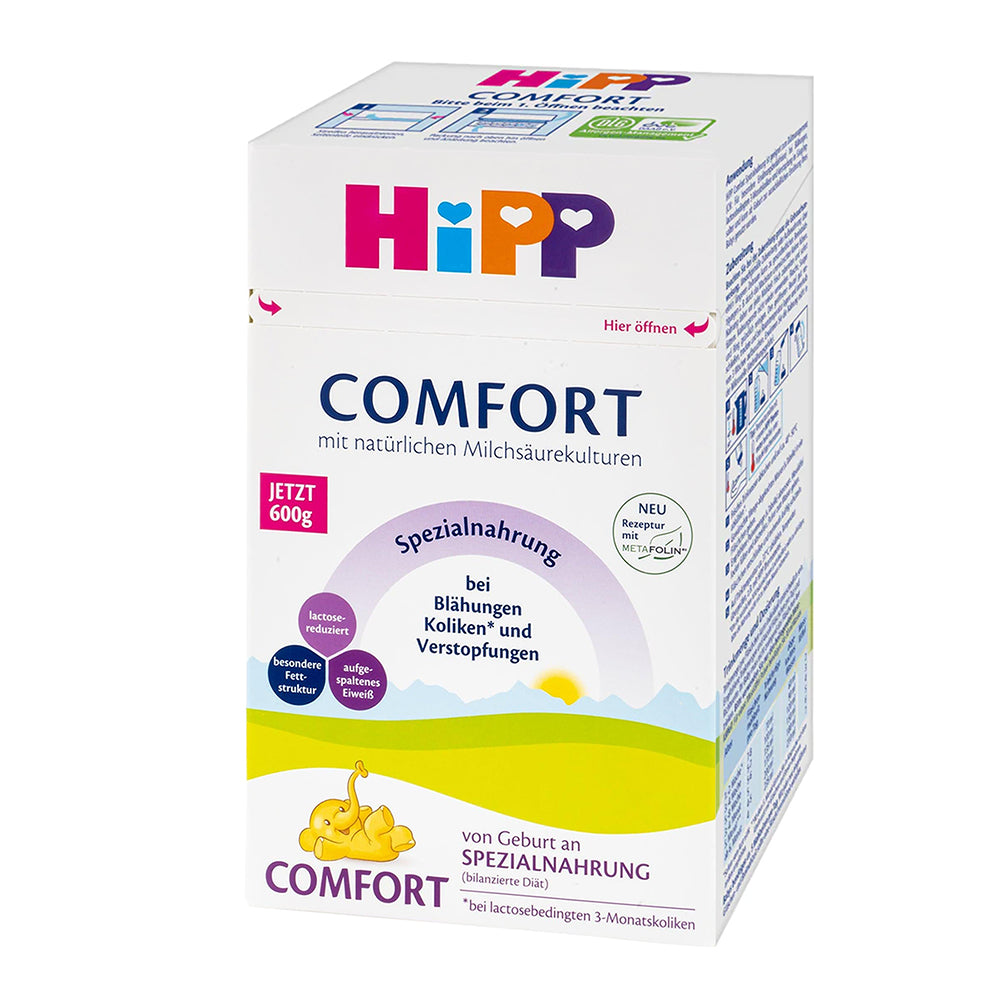
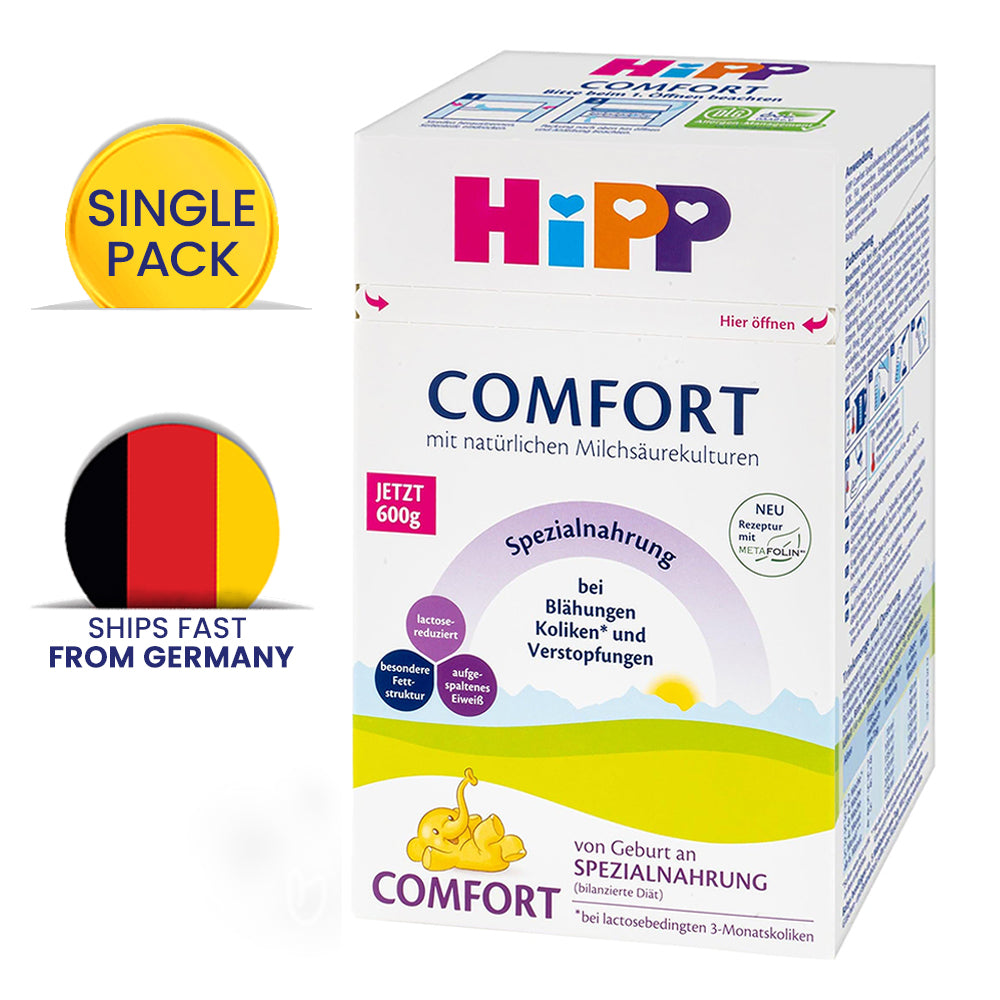
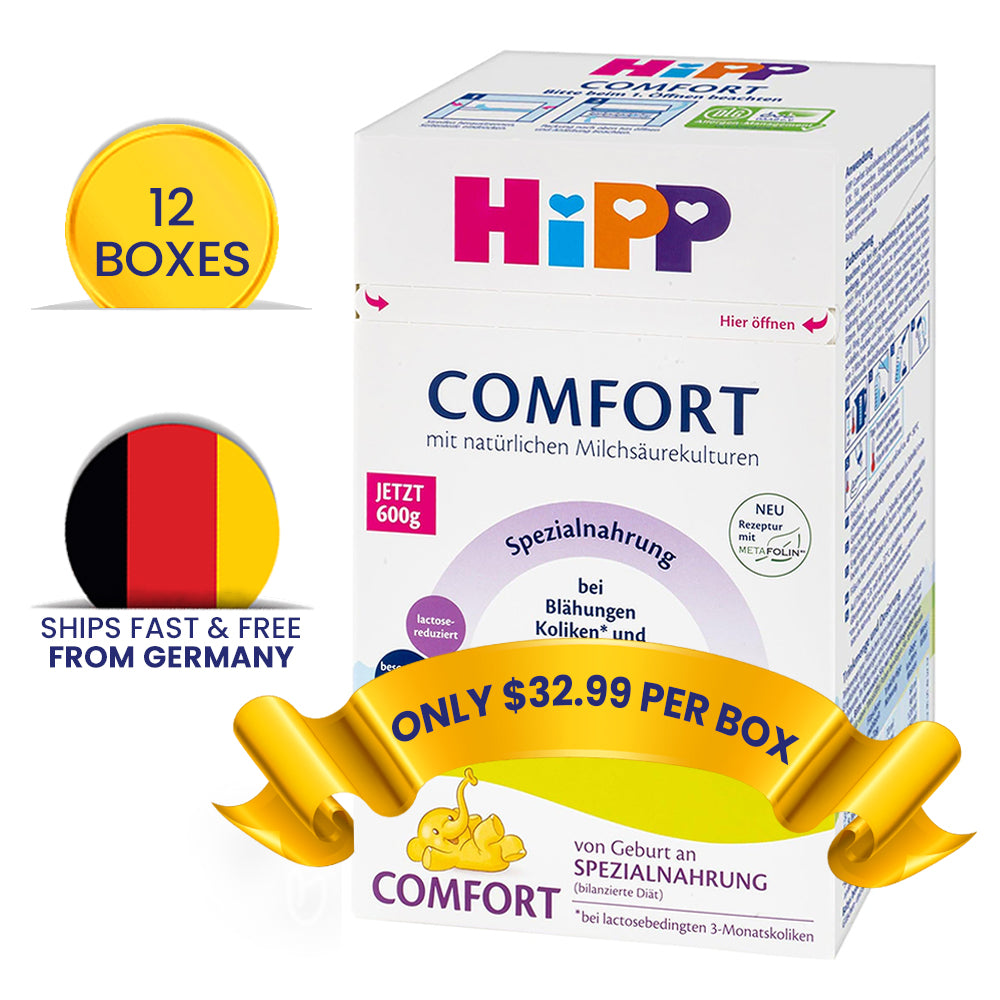
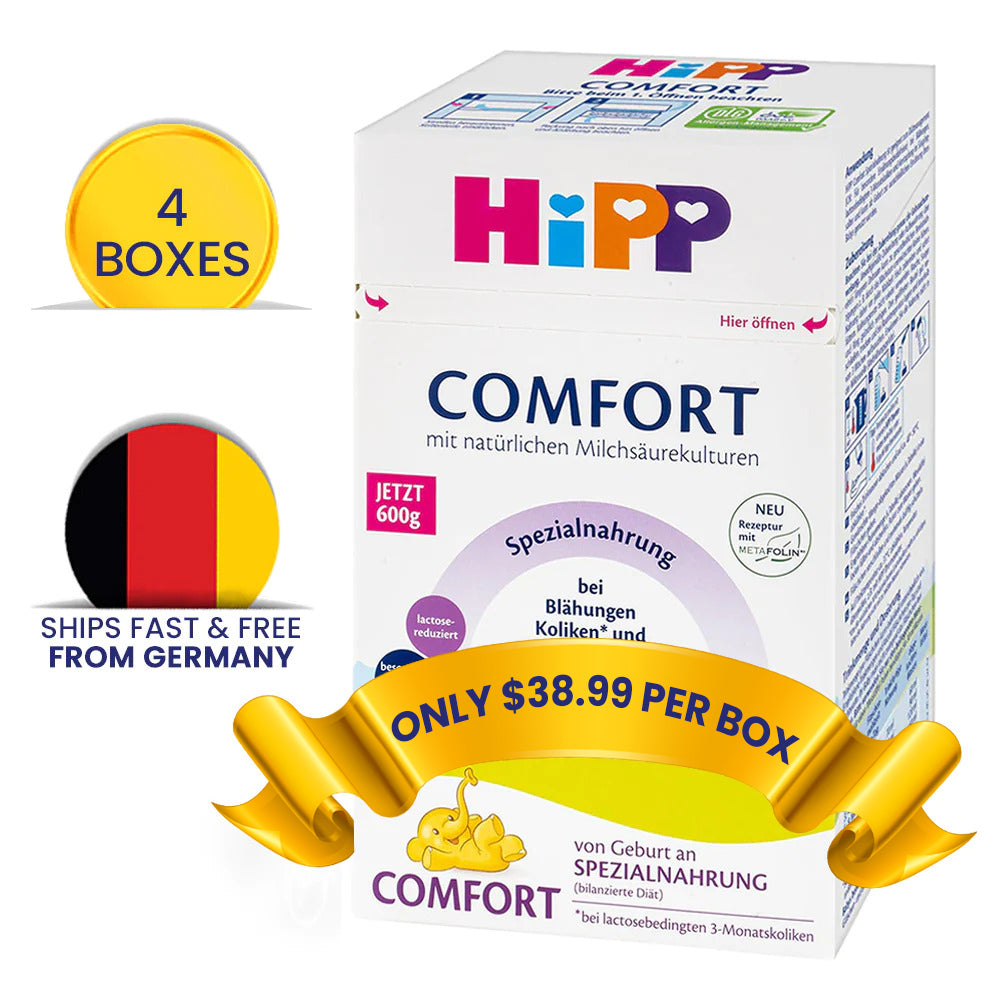
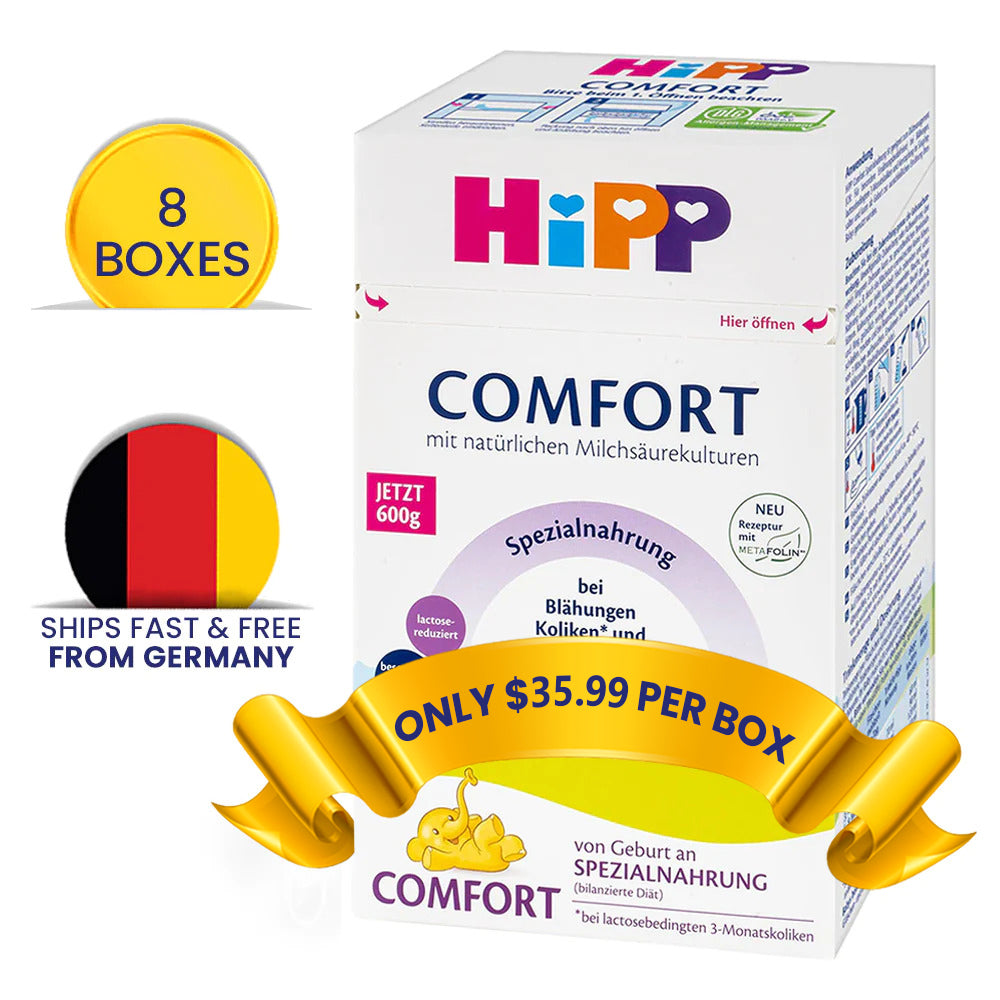
HiPP Comfort Special Milk Multi-Stage Formula (600g)
$38.99 - $395.88
-
AGE: From Birth Onwards
YIELD: Approximately 158oz of Formula
HiPP Comfort is especially formulated to address gassiness, lactose-related "3 months' colic" and constipation. A sensitive tummy in the first weeks and months of life is not uncommon and your baby's digestive system is often not yet fully developed, which can lead to gassiness, colic, and constipation. This, in turn, often manifests itself in the form of excessive crying, which can weigh heavily on family and parents.
Through its special formulation, HiPP Comfort also loosens baby's stool and helps to regulate bowel movements. While HiPP Comfort does contain some lactose as a carbohydrate source, HiPP Comfort contains substantially less lactose than most HiPP formulations, including HiPP HA. The milk protein contained in HiPP Comfort is based on extensively hydrolyzed whey protein, making the protein structures smaller, more similar in size to human breast milk proteins and, thus, easier for baby to process. This means that HiPP Comfort is also a good fit for babies that are at risk of developing allergies even though Comfort is not specifically designated as a "hypoallergenic" formula. HiPP Comfort also contains a special, breastmilk-like fat formulation called beta palmitate, which has been linked to better calcium absorption, bone density and other desirable outcomes. Importantly, HiPP Comfort also contains prebiotics (Galacto-oligosaccharides derived from lactose) and probiotics modeled on those found in human breast milk. HiPP Comfort also contains added omegas 3 and 6 and DHA. For a better understanding of how HiPP Comfort differs from HiPP's hypoallergenic HA PRE, 1 and 2 products, we wrote an article in The Digest on this topic recently.
Certified organic by EU standards
Print English Instructions
View Original German-Language Labels - Formulated for gassiness, colic and constipation
Hydrolyzed milk protein
Reduced lactose content
Probiotics based on strains found in human breast milk
Prebiotics improve gut health and help prevent constipation
Omegas 3 and 6, including DHA
No corn-based sweeteners
No soy
No gluten
No GMOs -
Lactose, maltodextrin, vegetable oils (sustainably produced palm oil, rapeseed oil, sunflower oil), starch, beta-palmitate (a), hydrolyzed whey protein, galacto-oligosaccharides (GOS) from lactose, calcium orthophosphate, emulsifier: citric acid esters of mono- and diglycerides of fatty acids, potassium chloride, fish oil (as DHA source), choline, algae-oil (M. Alpina) as DHA source, L-phenylalanine, L-tyrosine, potassium hydroxide, magnesium chloride, sodium citrate, sodium hydroxide, L-arginine, calcium carbonate, L-histidine, calcium chloride, L-tryptophan, inositol, iron sulfate, L-carnitine, zinc oxide, pantothenic acid, natural lactic acid culture (lactobacillus fermentum CECT5716), niacin, vitamin E, copper sulfate, vitamin A, vitamin B2, vitamin B1, potassium iodate, vitamin B6, folic acid, sodium selenate, vitamin K, biotin, vitamin D, manganese sulfate, vitamin B12.
(a) beta-palmitate is a special fat structure that is similar to fat structures found in breastmilk. Beta-palmitate produced with palm and sunflower oil.
-
PREPARATION INSTRUCTIONS

- Boil water freshly for each of baby’s meals and allow to cool down around 120 degrees Fahrenheit
- Pour in the necessary amount of boiled water per mixing table below into a clean and sterilized bottle
- Using the scoop provided with your box of formula (note that spoon sizes vary by brand and even lot), add the correct number of leveled scoops of powder (1 leveled scoop of powder per 1oz / 30ml of water)
- Close the bottle with the nipple/cap and vigorously shake
- Cool to drinking temperature (approximately 98 degrees Fahrenheit or ~ 37 °C) and ALWAYS test the temperature of the milk before feeding to avoid scalding or burning your little one
There are many mothers that regularly use distilled water without boiling it, apparently with no negative consequences. We cannot recommend this approach and there are actual reasons global health organizations recommend boiling the water and then mixing at a reasonably hot temperature (but not too hot to avoid damaging the probiotic cultures). Watch this video for more insight into this topic.
MIXING AND FEEDING INSTRUCTIONS (HiPP COMFORT)
AGE
BOTTLES PER DAY
WATER (OZ)
# OF SCOOPS
0 to 2 Weeks
7-8
2
2
3 to 4 Weeks
5-7
3
3
5 to 8 Weeks
5-6
4
4
3 to 4 Months
5
5
5
5th Month
4-5
6
6
6 Months and Beyond
4
7
7
DON’T FORGET
- ONCE YOU HAVE OPENED THE INNER FOIL BAG CONTAINING YOUR FORMULA, YOU SHOULD USE WITHIN 2-3 WEEKS. AVOID STORING IN AREAS OF HIGH HEAT OR HUMIDITY
- IF MIXED FORMULA IS NOT CONSUMED WITHIN AN HOUR, YOU SHOULD DISCARD IT
- DO NOT MICROWAVE BOTTLES OR FORMULA






